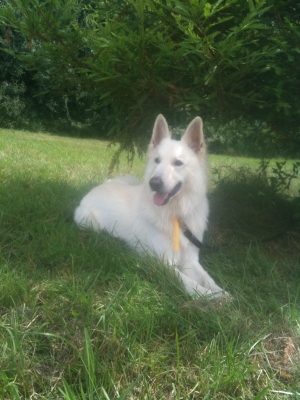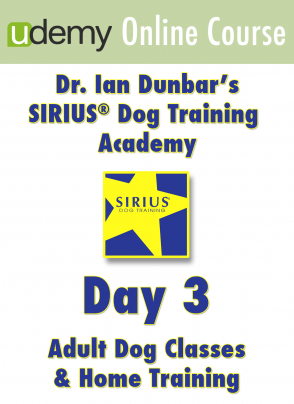Day 2: Reinforcement Schedules, Punishment and Rekindling the Relationship in Dog Training
Let's Just Be Humans Training Dogs

Basing dog training on a misunderstanding of wolf behavior is as useful as basing human education on a misunderstanding of chimpanzee behavior.
Dogs are not wolves and dog behavior is not the same as wolf behavior. In fact, the most striking difference between dog and wolf behavior is their interaction with people. Wolves have been naturally selected to grow up to be wary of people, whereas dogs have been artificially selected for their ease of socialization towards people. Consequently, it is hardly sound to use wolf behavior as a template for dog training.
Also, dog-dog interactions are very different from wolf-wolf interactions. Dog behavior is like watching simplified wolf behavior in slow motion. By and large, dogs are easy to read and usually give ample warning (intention signals) of their actions and reactions, whereas watching wolves requires a brain with a few more GHz and a bunch more Gigabytes.
To cavalierly and simplistically summarize considerably complicated canid social behavior as “a dominance hierarchy with an alpha dog dictator”, is an insult to both dogs and wolves, and, advertises a complete misunderstanding of their most sophisticated social structure. Whereas misunderstandings are understandable and excusable, we have to stop at people imposing the weirdness of their misunderstandings upon others. To extrapolate a misunderstanding of wolf and dog behavior to dog training by citing slippery, phantom concepts of “dominance” and “alpha” as excuses to physically bully dogs is both unfounded and quite distasteful.
But regardless of the above, I think we are missing the major point. As intriguing as it may be to observe and debate the development of social behavior of dogs (a subject that formed the focus of my research for nearly a decade), dog social structure and behavior actually have very little, if anything, to do with training! Social behavior and dog training are two entirely separate and distinct disciplines and any notions of wolf, or dog, hierarchical social structure, whether hypothetical or real, are simply irrelevant to the training of dogs. Whether we consider a dog to be a subservient, obsequious wimp, or an ultra-mega, alpha-dominant, human-dissing dog that is plotting to take over, first the family and then, the world … we still have to train the little doggie to like people and to respond reliably to basic manners.
Dog training comprises four aspects of changing the frequency of behavior: 1. Increasing the frequency of behavior e.g., training a dog to settle down more often; 2.Decreasing the frequency of behavior, e.g., training a dog to bark less; 3. Training a dog to respond reliably on cue, e.g., to always sit when requested; and 4. Training a dog to reliably cease responding on cue, e.g., to always stop barking when requested.
Now, certainly, we can use training (classical and operant conditioning) to effectively alter a dog’s behavior towards other dogs and people and by so doing, change doggy social behavior. However, we cannot employ theoretical argument regarding canine social behavior to effectively train dogs, i.e., to teach them to come, sit, lie down, or rollover. Moreover, wasting precious training time going on and on about supposed dominance, alpha and other unlikely suspected causes, severely detracts from getting on and resolving the usually not-too-difficult problems.
Let’s keep it simple. If the dog jumps-up, teach her to sit when greeting people. If the dog pees in the house, housetrain him. If the dog barks excessively at inappropriate stimuli, teach her to Shush on cue. If the dog pulls on leash, teach him to walk on a loose leash. If your dog wants to eat before you, feed her first — just as long as it’s OK with you. If your dog wants to sleep on the couch or your bed, let him — just as long as it’s OK with you (and your spouse) and the dog will move over or get off the couch/bed when requested. It’s really that simple; think how you would like your dog to act and then train and motivate the dog to want to act that way. There’s no need for a battle.
If you don’t know how to train the dog, it’s OK. No biggie. Come and learn how. But please don’t just assume that it’s all the dog’s fault. Don’t reflexively blame your dog. Don’t call your dog names. Don’t assume that your dog is wolfy, or contemplating world domination. And above all, don’t make alpha-dominant excuses to make your dog’s life a misery by psychologically or physically bullying him/her under the guise of dog training. Instead, as a human being with a supposedly superior-functioning brain, give your dog the education that he/she deserves. As humans, we don’t walk on our knuckles when teaching children to read.










